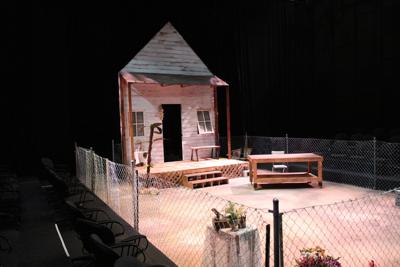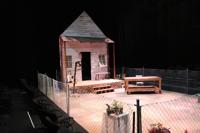
On Friday, April 19, I attended the ASU Theatre’s performance of “Mojada” by Luis Alfaro and directed by ASU’s director of theater, Daniel Anderson.
“Mojada,” a derogatory term in Spanish, is a reworked play, written by Alfaro, but based on the play “Medea” written by Euripides in 431 B.C. “Mojada” is a play about a family who immigrated from Michoacán, Mexico to Boyle Heights in Los Angeles. The family consists of the wife, Medea, the husband, Jason, and the son, Acan. The story conveys the risks and struggles of the family but focuses mainly on Medea. Alfaro relates the original work, “Medea,” to the current immigration crisis, but focuses on the emotional toll of both sides of the debate.
“We will take this word; this ‘Mojada’, this derogatory word slur; this demeaning term and reclaim the word and try to show power in it and show strength in it, and by doing that shows strength in the culture,” Anderson said. “This word is a powerful thing, it signifies a journey, it signifies a struggle, it signifies a culture of people that have fought to earn their right here.”
Josefina, a friend of Medea, is played by Genesis Garza. Garza discussed how it was a really important role for her to play.
“She’s a chismosa but she doesn’t care and she works hard for, like, what she wants,” Garza said. “It’s something that like a lot of us have had to deal with being Hispanic…working hard for our place in society.”
Medea is played by Catalina Perry-Bejar, whose grandmother is from Michoacán, just like her character, so it was special for her because of that relationship.
“It is probably one of the most rewarding characters I’ve ever played,” Perry-Bejar said.
Anderson chose this performance because they wanted to continue with plays that connect to modern times. Similar to their last play, “The Crucible,” “Mojada” reflects on modern issues.
“We thought it was a really important story to be telling,” Anderson said.
This performance made me laugh, made me think and made my jaw drop.
When you first walked into the theatre there was Spanish music playing and radio interviews with first-generation families. The set consisted of the front of the house, a sewing machine with a station, a front porch, flower pots and a front yard. Anderson conveyed that working with the smaller cast allowed them to have a more intimate relationship with each other, and cast members expressed their gratitude to Anderson for helping them connect with their characters and find the best way to express them.
There were a total of six cast members and each spoke a mix of Spanish and English throughout the production. As a native English speaker, it was easy to understand and the cast did a phenomenal job at communicating what they were saying using their emotions.
The character Acan, who is Medea and Jason’s son, was played by Juan Rodriguez.
Rodriguez expressed that it was hard to play a character around half of his age but he was able to improve with the help from the director.
“I like how I ended up getting to know this character by embodying him,” Rodriguez said.
Jasmine Solis played Tita, a spiritual healer who supports Medea throughout the show. Solis was able to connect with not only her character but the story as well. Solis explained that Tita her and Tita share the same religion and she found it special to have that connection.
“This role is very close to me because it reminds me a lot of my family, especially my mom and my grandma, and so being able to play this role, it kind of like connects me more to them,” Solis said.
With a single set, there were minimal changes. At times in the production, there would be monologues to describe past events. During these times, the set would change along with the lighting. Changes in lighting helped to signify what was happening throughout the play. To follow the play was to follow the spotlight.
Another impressive quality of the play was the sound design. When the sewing machine was in use, you could hear the machine working. There was also a radio playing which you could also hear. I thought that these added some emphasis to the performance.
The cast used off-screen acting to convey some of the tougher topics in the production. This was an impressive part of the performance.
Anderson has directed many plays at ASU and said that this was one of the best he has done so far because he was able to connect with the play personally.
“I’m extremely proud of them, I'm extremely proud of the work that they’ve done, they’ve really respected the scenery, they really embraced what we were trying to do and they really put themselves out there,” Anderson said.
The John F. Kennedy Center for the Performing Arts will be attending the production at ASU due to the production being entered into the Kennedy Center American College Theater Festival to receive some national recognition at ASU.
“Mojada” will be shown April 25-27 at 8 p.m. and on April 28 at 2 p.m. in the ASU Modular Theatre located in the Carr Education and Fine Arts building. The show is recommended for audiences 18 and older as there are some adult themes portrayed.







(0) comments
Welcome to the discussion.
Log In
Keep it Clean. Please avoid obscene, vulgar, lewd, racist or sexually-oriented language.
PLEASE TURN OFF YOUR CAPS LOCK.
Don't Threaten. Threats of harming another person will not be tolerated.
Be Truthful. Don't knowingly lie about anyone or anything.
Be Nice. No racism, sexism or any sort of -ism that is degrading to another person.
Be Proactive. Use the 'Report' link on each comment to let us know of abusive posts.
Share with Us. We'd love to hear eyewitness accounts, the history behind an article.
Any infractions against the above rules will result in comments not being published.